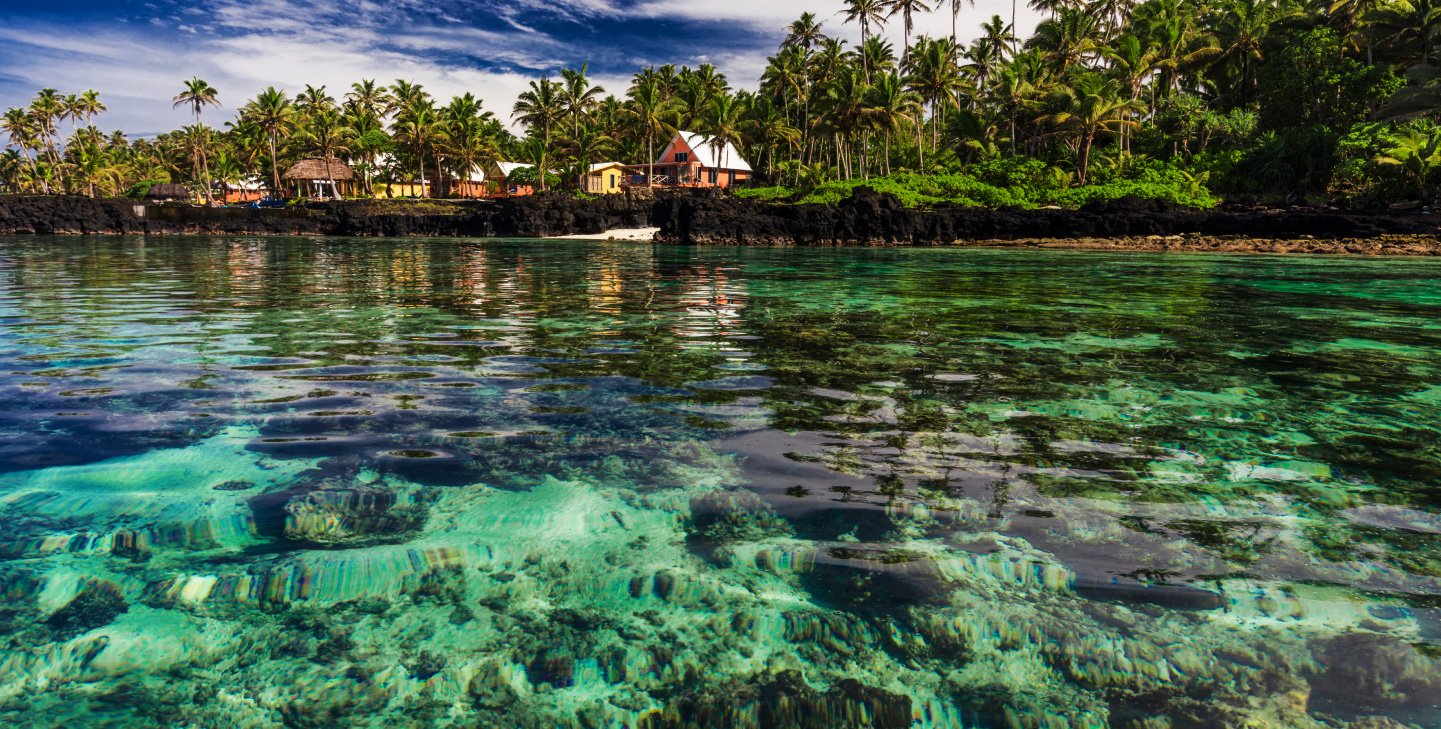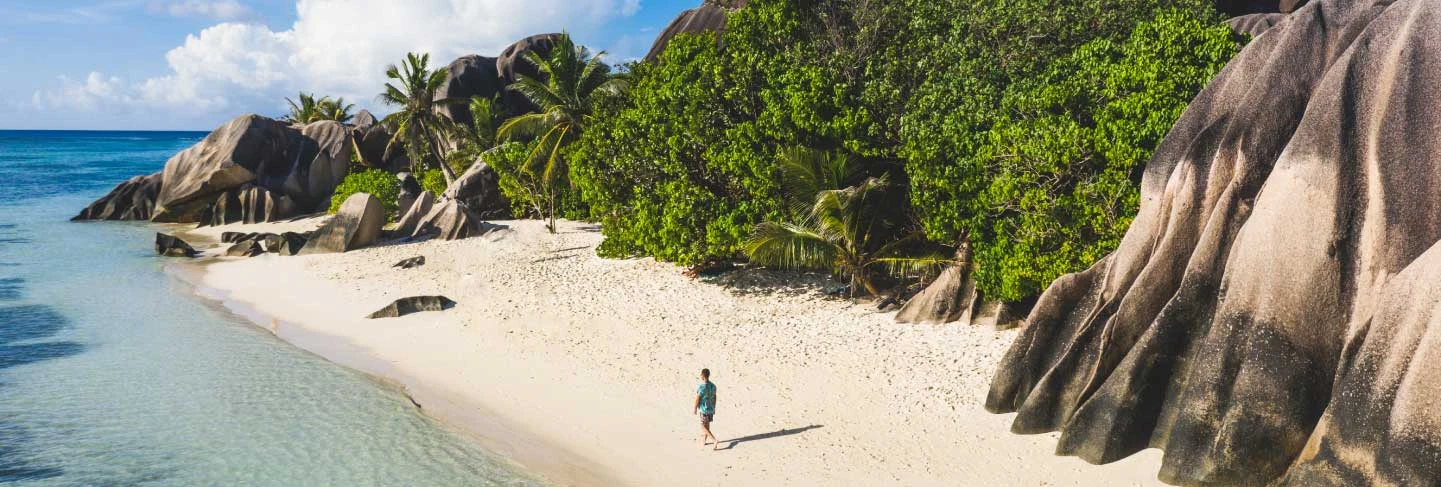Volunteer in Fiji
Preserving coral reefs and marine environments.
Fiji – an archipelago in the South Pacific – is famous for its palm lined islands, warm and welcoming hospitality, and distinctive culture and customs. Find adventure – and purpose – among the tropical jungles, coral reefs and friendly communities of this truly beautiful destination.
When you join a volunteer program in Fiji, you’ll get to experience firsthand the amazing marine life and coral reefs of the Pacific Ocean. Fiji has an incredible diversity of almost half of the world’s coral species, making it a truly special place to explore. By getting involved in conservation efforts, you’ll not only learn about these fragile ecosystems but also play an important role in their protection and preservation.
Why the conservation of marine life matters
Marine environments in Fiji and around the world are in danger. The ocean’s temperatures are rising at an alarming rate due to the climate crisis, and this, along with plastic and other types of pollution, tropical storms, and unsustainable fishing practices, is causing a significant threat to the health of marine life. These environments, like Fiji’s coral reefs, play an essential role in providing both nutrition and economic opportunities through fishing and tourism for the local population. It’s crucial to protect these valuable resources, and you can help make a difference.
As a volunteer on a program in Fiji, you’ll assist with collecting data on how marine life is dealing with these threats and help local governments like Fiji’s Ministry of Fisheries make decisions about how to effectively manage marine resources.
Filter programs
Contribute to sustainable conservation projects led by experts.
Use your unique skills and expertise to support conservation projects.
The adventure of a lifetime while making an impact with a group of like-minded teens.
Generate solutions to help solve conservation challenges through research projects.
Turn your passion into your profession with a three-month placement at an NGO.
Make the most of our unique programs with these exclusively curated local adventure and wellness experiences.
Marine conservation programs in Fiji
As a conservation volunteer or intern in Fiji, you’ll be part of a team that’s dedicated to researching the impact of climate change, overfishing and plastic pollution on Fiji’s coastal habitats, coral reefs and marine species. Together with our local partner organisations, including the Fiji Locally Managed Marine Area, we work to find sustainable solutions to these urgent issues. Fiji’s coral reefs have been badly affected by coral bleaching, making this work even more important for their survival.
One way we collect valuable marine conservation data is through the manta tow method. Our Fiji marine conservation volunteers get to experience this firsthand by donning snorkelling gear and being slowly pulled behind a boat. During this time, they assess the health of coral habitats and fish populations, paying close attention to factors such as the vibrancy of the corals. All of this important information is then recorded on a waterproof data sheet once the boat stops. The manta tow method is an effective way to monitor large stretches of the reef, even when resources are limited.
You can choose from a wide variety of volunteer, internship, research fellowship and apprenticeship programs in Fiji:
- Coral reef research volunteering
- Climate change and coral bleaching volunteering
- Marine conservation volunteering
- Sustainable fishing volunteering
- Tropical marine biology and conservation volunteering
- Coral reef ecology and conservation internship
- Marine conservation internship
- Sustainable fishing internship
- Marine conservation research fellowship
- PADI Divemaster and marine conservation apprenticeship
PADI qualifications in Fiji
In Fiji, participants have the opportunity to earn a variety of PADI qualifications, such as Open Water, Advanced Open Water, Divemaster, Emergency First Response, Rescue Diver and the Marine Megafauna (MMF) Distinctive Specialty. Exclusively offered by GVI, the MMF certification enhances diving skills tailored for marine megafauna conservation projects.
Participants in Fiji can also earn a range of other PADI qualifications, including Open Water, Advanced Open Water, Divemaster, Emergency First Response and Rescue Diver.
If you’re interested in our Fiji community development programs, head on over to our GVI People site. We offer programs focusing on the following important work:
If you join one of GVI’s conservation programs as a volunteer or intern, you’ll be based on the main island of Viti Levu in the district of Dawasamu. Living in this community offers you the unique chance to experience Fiji’s traditional culture firsthand. When you arrive, the local community will welcome you with a traditional ceremony, and if you’re of age, you may even attend a kava ceremony. Kava is a special drink that is prepared in front of the community leaders, and it’s an important part of Fiji’s traditional culture. Depending on when you join the program, you might also have the opportunity to attend a meke, which is a traditional dance ceremony.
- Live in the remote village of Silana, an area relatively untouched by tourism, which offers a glimpse into the Fijian way of life.
- Dive in the magnificent coral reefs in the area, such as Moon Reef, where many of the world’s species of coral are found.
- Encounter a variety of marine species, including tropical fish, green and hawksbill turtles, reef sharks, bottlenose dolphins and a resident pod of spinner dolphins.
- Enjoy traditional Fijian cuisine made with fresh local produce. You’ll find a range of dishes that represent the diverse culture of Fiji, each with its own mix of flavours.
- Spend your weekends scuba-diving, visiting nearby islands, exploring the surrounding areas or taking a trip to the city of Suva.
- Gain a number of PADI qualifications, including Open Water, Advanced Open Water, Divemaster, Emergency First Response, Rescue Diver and the unique Marine Megafauna (MMF) Distinctive Specialty offered by GVI.
- Get career experience with a guaranteed three-month work placement in Fiji, Mexico or Thailand when you complete a professional apprenticeship program.
GVI’s programs are compliant with rigorous ethical guidelines. We are governed by our ten ethical principles and five human empowerment principles. We also hold a badge of ethics – our dedication to continuously reflect on and improve our policies and practices.
At GVI, we take collaboration seriously. Every program we offer is created in partnership with local organisations, so we can work together towards long-lasting solutions. To make sure we’re staying on top of our game, we have a team of dedicated environmental impact and science officers on the ground who ensure that our conservation projects meet the highest standards. This means that our efforts are based on the latest research and most effective techniques.
Each of our programs is aligned to one or more of the United Nations Sustainable Development Goals (UN SDGs). In Fiji, as most of our programs are focused on marine conservation, our main focus is UN SDG 14: Life Below Water.
You can read about the work we’ve done with the help of volunteers and interns like you in our Impact and Ethics Report.
Who can join a marine conservation program in Fiji?
You can!
Anyone over 18 (including college students and gap year students), people on a career break and older adults can join our Fiji volunteer programs at just about any time throughout the year.
If you are under 18 and want to join a conservation volunteering program, you can find a wide selection of opportunities designed specifically for teens here.
Who qualifies as a marine conservation volunteer?
You do! We don’t require any pre-existing qualifications or certifications. However, in order to conduct surveys of marine life and coral reef ecosystems, volunteers or interns will have a PADI Divemaster qualification included as part of their program.
Is it safe?
Extremely safe. We take every precaution to make sure our participants live and work safely, no matter where they are in the world. We have trained support staff on hand 24 hours a day to ensure that all participants across all of our programs are well taken care of.
You can speak directly to one of our enrolment officers or alumni, who can answer any and all questions you might have about life in Fiji, life on the GVI base, or the experience of working in a marine environment.
Who will I live with?
GVI volunteers in Fiji live in shared bures (traditional huts). You will live and work with other volunteers, interns and GVI staff from all around the world. Living in an international community such as this with like-minded individuals is why many of our participants leave our programs with life-long friends.





























